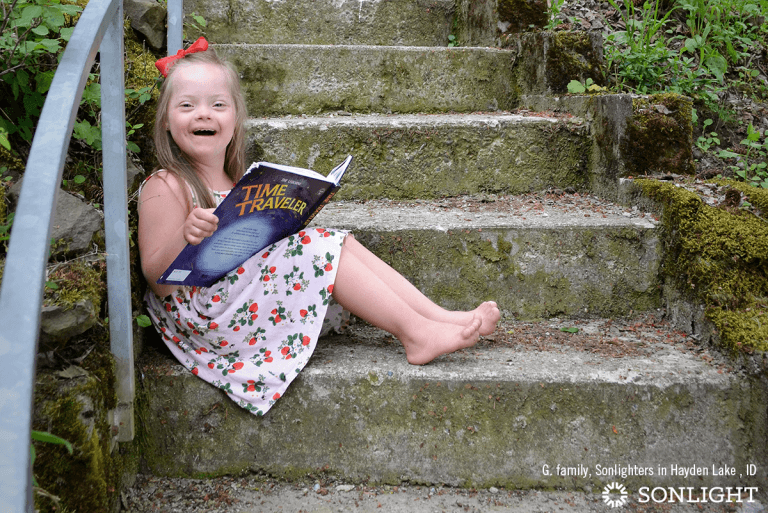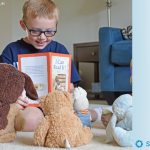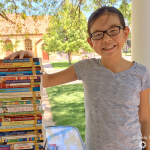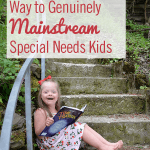My 11 year-old son, Phineas, has significant learning differences. Although the classroom model of schooling could be stretched far enough to mainstream this special needs kid with his peers, his specific challenges mean that it's not the best choice. Full-time inclusion in a group of students presented with fifth grade-level work doesn't work for him or them.

Our local district utilizes resource rooms for special education. Phineas would bounce between a traditional class setting and a targeted group of students. Seeing special teachers and therapists on a rotating weekly schedule is far from the ideal solution for a child who needs strict consistency to integrate information at all.
As he will soon be aging out of elementary school, the picture gets even more muddied. Special education options narrow as children age, with a pointed focus on life skills and employment training.
The Wider Gate That Homeschooling Offers Special Needs Children
Interestingly, just as the professional school system would begin pointing my son away from a more well-rounded education, Sonlight’s literature-based learning is opening the doors to something much richer for Phineas.
While he still spends plenty of hours each week learning and reviewing previous information, trying to meet new baseline learning objectives, he also has the opportunity to be immersed in a rich variety of subjects:
- folk tales
- classical music
- Scripture memorization
- missionary adventures
- whole-world geography
Special education departments in public schools cut these areas in order to spend time drilling information that can be measured on end-of-year tests and held up to IEP goals.
But quality of life, truly, cannot be measured. For example, Phineas has developed a love for poetry through exposure and joyfully sings bits of Scripture he memorized in song thanks to Sing the Word. Neither of those count as skills, but they certainly count as something that will contribute to his joy and character as he grows!
Truly Mainstreamed with Homeschooling
In the artificial environment of a classroom, a teacher (and an aide specially assigned to my son) tries to create an inclusive environment for Phineas. But that means he's tied to
- textbooks he can’t read
- worksheets he can’t fill out
- activities he can’t follow
The school calls this mainstreaming.
In contrast, homeschooling is true mainstreaming—an actual picture of what it means to be folded into a group of diverse students. Learning together from the same book—whether it’s a beautiful fictionalization of history or a detailed look at the flora and fauna of a far-off country—is a great leveler. All ears tune to one thread of information, and that thread weaves the listeners together. At the end of the day, that shared experience bubbles over into creative play and exploration that all can share, regardless of cognitive differences.
A poignant example of this truth happened recently when my family revisited The Boxcar Children as a part of our newest kindergartner's Sonlight experience. While my intended audience was one child, five gathered. Phineas was among them, and he sat in rapt attention as the story unfolded over the next several days.
Each afternoon, I watched all five children, ages 3 through 11, work tirelessly on the boxcar they were assembling in our yard.
They problem solved.
- Mom shot down our idea to bring actual dishware outside, so how can we improvise?
- If we needed to wash things here, where would we go?
- How long do you think we could stay out here if we had to?
They discussed characters, emotions, and behavior.
- Do you think Benny was scared?
- Why didn’t Dr. Moore just tell Henry everything he knew?
- What would have happened if Henry had told the truth about his name at the race?
They lugged logs and swept dirt floors.
Together. With no aide running interference to help Phineas synthesize the information, and no written test for everyone afterward.
The Purpose of Learning
As the mother of a son with severe special needs, I understand the pressure to push for opportunities that allow every child to meet his or her full potential. I understand the tug of the school district’s special needs program or the workbook-based curriculum that will hit, over and over, on the basics.
I understand the pull to focus on those box-checking skills, like writing, counting, and reading. But I also know that an education which focuses only on those things—an education that leaves out the real heart of life—falls short of the joy that is real learning: being able to more fully appreciate the beauty of God’s world.
Every child deserves that gift—regardless of learning differences.
To find out more about Sonlight's flexible, book-based homeschool programs, order a complimentary copy of your catalog today.









Homeschooling has always been the education I wanted for my children. I feel many negative people have put a wedge between my ability to do so. Its a career long struggle against those that don't believe I can accomplish it, typical modern day life style distractiins, and the normal rebellion of kids who easily get frustrated with a subject that they don't see is necessary at the time (ex math or history).